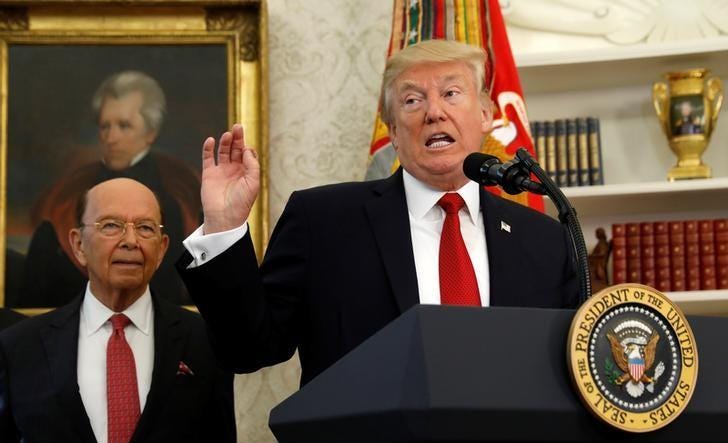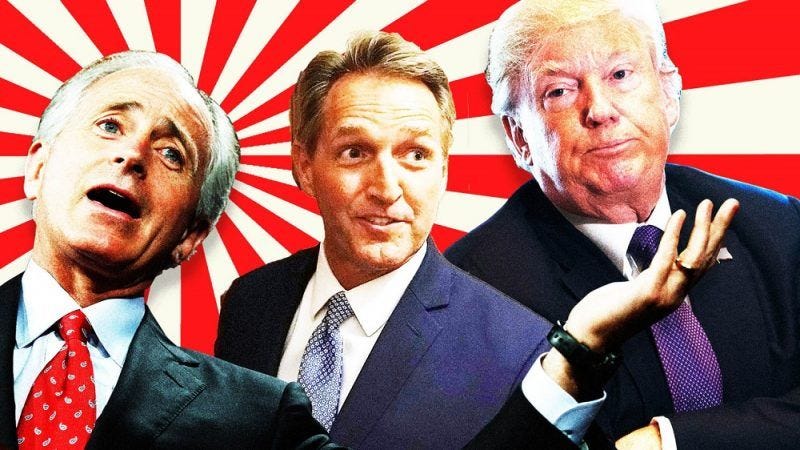Fact Check: Donald Trump gets it wrong on Paul Manafort, Rick Gates ‘hoax’
Click to read the full story: Fact Check: Donald Trump gets it wrong on Paul Manafort, Rick Gates ‘hoax’
Donald Trump sent Sarah Sanders out to face a very hungry press today, and she did her best to stand firm on the White House claim that there is absolutely no collusion between the campaign and Russia.
As they continue doing, she tried to downplay the role of George Papadopoulos in the Trump administration, but Sean Spicer tried the same tactic with Mike Flynn and Paul Manafort. He tried to diminish both their roles to basically volunteers, and that’s how they’re doing with Papadopoulos even though facts are standing in their way.
President Donald Trump misstated the reach of the indictments against his former campaign chairman Monday, claiming it deals with activities “years ago,” before he was running for president. Actually, some of the criminal behavior alleged in the charges is as recent as the early days of his presidency.
TRUMP tweet: “Sorry, but this is years ago, before Paul Manafort was part of the Trump campaign.”
THE FACTS: Not true, according to the indictment.
Manafort and his associate Rick Gates are charged with criminal activities that go back to 2006 but extend to February of this year. The charges do not refer to Manafort’s activities with the campaign but rather accuse him of laundering money and conspiratorial acts before, during and after he had that job.
Manafort and Gates face 12 counts and do deal largely with activities from 2006 to 2015, before Manafort joined the campaign in March 2016.
But both are charged with conspiring together and with others to knowingly and intentionally defraud and commit crimes against the U.S. from 2006 to this year.
And both are charged with conspiring together to make false statements and conceal crimes against the U.S., and to causing others to do so, from November 2016 to February 2017.
The indictment alleges that Manafort and Gates acted as unregistered agents of Ukraine’s former pro-Russia leader, government, and party from 2006 to 2015. The indictment says that “from approximately 2006 through at least 2016, MANAFORT and GATES laundered the money through scores of United States and foreign corporations, partnerships and bank accounts.”
Manafort was hired in late March 2016 as the campaign’s manager for the Republican convention in July. He was promoted to campaign chairman in mid-May, more than a month after he essentially assumed control, then pushed out Aug. 19 when questions intensified about his lobbying for Ukraine interests.
This indictment is the first to emerge from the broad investigation by special counsel Robert Mueller into Russian interference in the 2016 U.S. election and possible collusion between the Trump campaign and Russia. It does not go to the heart of that matter.
But separately, it was revealed Monday that an adviser to Trump’s campaign pleaded guilty to lying to the FBI about his contacts with Russian professor who has close ties to the Russian government. George Papadopoulos had told the FBI that his interactions with the professor, who promised “dirt” on Trump’s presidential rival Hillary Clinton, came before he joined the campaign. In fact, Papadopoulos was already a foreign policy adviser to the Trump campaign when he met the professor in mid-March 2016 and interacted with him after, according to the court statement unsealed Monday.
That was the first criminal count that cites interactions between someone in the Trump campaign Russian intermediaries.

President Donald Trump and his vice president came out this past week with initiatives that are not as big, bold or immediate as they appeared.
Despite the drum-roll implied in Mike Pence’s recent remarks to Christians, the U.S. is not suddenly walking away from U.N. humanitarian relief programs and switching all that money directly to persecuted religious groups. And Trump’s action on the opioid epidemic counts on a powerful anti-drug punch from advertising, a feeble weapon at least in the past.
A look at their statements and other rhetoric from the week:
TRUMP on a planned ad campaign against the opioid epidemic: “I think that’s going to end up being our most important thing. Really tough, really big, really great advertising, so we get to people before they start.” — remarks Thursday.
THE FACTS: He may prove history wrong, but past marketing efforts to scare young people from using drugs had poor results. More broadly, Trump’s declaration of opioid overdoses as a public health emergency is not as consequential as it might sound. It does not bring new dollars to the anti-opioids fight. It does make it easier for the government to shuffle resources and make other changes, such as expanding access to medical services in rural areas.
As for advertising, the government spent nearly $1 billion from 1998 to 2004 on a campaign to discourage illegal drug use by young people. A study financed by the National Institutes of Health concluded in 2008 that the campaign “had no favorable effects on youths’ behavior” and may have prompted some to experiment with drugs, an unintended “boomerang” effect.
A 2009 review of 20 studies of school-based D.A.R.E. programs found that students in the programs were about as likely to try drugs as those who didn’t. Founded in the early 1980s, D.A.R.E sent police officers into thousands of U.S. schools to warn about the dangers of drugs.
More recently, anti-drug campaigns have appealed to teenagers’ desire for independence and self-control rather than drug fears. A 2011 study of the government’s “Above the Influence” campaign suggested eighth-graders who had seen the campaign were slightly less likely to have tried marijuana than those who had not.
PENCE, on redirecting U.S. humanitarian foreign aid: “While faith-based groups with proven track records and deep roots in these communities are more than willing to assist, the United Nations too often denies their funding requests. My friends, those days are over. … . Tonight, it is my privilege to announce that President Trump has ordered the State Department to stop funding ineffective relief efforts at the United Nations. And from this day forward, America will provide support directly to persecuted communities through USAID.” — remarks Wednesday to a group helping Christians in the Middle East.
THE FACTS: “From this day forward” is a stretch, as are Pence’s other references to immediate change. The government is to study the matter. Studies take time, especially when multiple agencies are involved, and lead to conclusions that can’t always be foreseen at the start.
State Department spokeswoman Heather Nauert said not all U.N. relief programs would be cut off from U.S. financing. “The U.N. will still get some of its money for this, but we will look for other avenues in which to more efficiently fund these types of religious minorities so that they can eventually return back home,” Nauert said.
A White House official says the goal is to make sure necessary levels of relief are steered to persecuted religious minorities in the Middle East and as part of that, more grants will go directly to religious organizations and other groups. An analysis will be done by the State Department, U.S. Agency for International Development and the Office of Management and Budget, in conjunction with the U.S. ambassador to the U.N., “to determine how appropriated funds can best be spent,” the official said. This background was shared on condition of anonymity because the official was not authorized to be identified.

BOB CORKER AND THAT BOEING DEAL
TRUMP: “Bob Corker, who helped President O give us the bad Iran Deal & couldn’t get elected dog catcher in Tennessee, is now fighting Tax Cuts….” And: “Corker dropped out of the race in Tennesse when I refused to endorse him, and now is only negative on anything Trump. Look at his record!” — tweets Tuesday.
THE FACTS: Trump, who spelled Tennessee right the first time, continues to label the Republican senator an enabler of the Iran nuclear deal when he was a leading critic of it. Corker had nothing to do with the 2015 international agreement forged by the U.S. and other world powers to constrain Iran’s ability to build a nuclear arsenal. He argued at the time that President Barack Obama should have made the international pact a treaty subject to approval by the Senate. When Obama didn’t do that, Corker helped fellow senators write legislation that subjected the accord to periodic congressional review. The legislation would have blocked the deal if that effort got enough votes. It didn’t. Obama brought the deal into effect, not Congress.
On Corker’s political fate, Trump actually urged Corker to stand for re-election next year during a private meeting in September, media outlets have learned. And Corker’s chief of staff, Todd Womack, said Trump called Corker after that to ask that he reconsider his decision to leave the Senate. Trump “reaffirmed that he would have endorsed him, as he has said many times,” the aide said. Trump has not substantiated his competing claim that he withheld an endorsement of Corker and that’s why the senator decided to leave Washington.
Trump, on a contract landed by Boeing from Singapore Airlines: “In terms of the orders it’s about $13.8 billion and most importantly it’s about 70,000 jobs.” — at the signing of a “certificate of purchase” staged at the White House on Monday.
THE FACTS: Yes, but.
Boeing says the order will “sustain” more than 70,000 direct and indirect U.S. jobs for the company, its suppliers and others. The company did not say they were new jobs. The estimate of jobs and the value of the contract is based on full list price of the 39 planes Singapore Airlines has agreed to buy. Airlines routinely receive deep discounts from the list price of planes. So the contract, while unquestionably a big one, may end up worth less than $13.8 billion and have a less dramatic effect on employment than billed.
The contract wasn’t as new as it appeared: Singapore Airlines announced Feb. 9 that it signed a letter of intent to order the 39 planes from a U.S. manufacturer. Boeing booked the order in June but did not identify the buyer until this past week. Given the lengthy negotiations involved in airline purchases, it’s clear the order — announced by Singapore Airlines less than three weeks after Trump was sworn in — largely came together when Barack Obama was president. It’s unlikely either president had much to do with it.
The post Fact Check: Donald Trump gets it wrong on Paul Manafort, Rick Gates ‘hoax’ appeared first on Movie TV Tech Geeks News By: Shanka Cheryl
